Seven months after 68-year-old Larry Link was gunned down in the dusty expanse of the ghost town he owned and where he once hosted tourists, his murder remains unsolved.
Speculation about the killing — Link was shot five times, his scalp was lacerated and his chest and stomach were bruised — from neighbors and family members ranges from Mexican drug cartels to a random stranger, who might have happened across the collection of dilapidated clapboard, rock and log buildings that is Steins from nearby Interstate 10.
The investigation has stalled, with New Mexico State Police asking the public for help.
Authorities believe Link's death might have been a robbery gone wrong. A semi-trailer used for storage on the property appeared to have been broken into, with items from inside strewn on the ground.
Meanwhile, family members have announced that they will reopen the Steins Railroad Ghost Town for tours in May. The curious will be able to experience what was once a bustling mining and railroad town, which survived on water freighted in by the Southern Pacific, had competing bordellos and, most recently, a very modern episode of Old West violence.
Steins is located in far southwest New Mexico, atop the state's Bootheel, where nearby residents have long worried about drug trafficking and its related violence. The U.S. Border Patrol has recently stepped up its presence in the isolated and rugged region.
Rancher Judy Keeler said she and other area residents believe Link's murder was likely connected to drug traffickers passing through. She said in recent years neighbors have been victims of break-ins, have seen requests jump for food and water by passing migrants, and at times have been nearly run off county roads by high-speed chases between the Border Patrol and suspected traffickers.
Ranchers and authorities say it's not uncommon to stumble upon lost bundles of marijuana and wandering traffickers, "drug mules," as they attempt to make it through the Peloncillo Mountains along the Arizona-New Mexico border.
In June, Link's body was found lying near his vehicle between his property and the Union Pacific Railroad easement in Steins. His son discovered a small-caliber revolver believed by police to be the murder weapon not too far off the property.
The autopsy report said Link suffered gunshot wounds to the heart, shoulder, arm and back.
"Sadly, it wasn't a surprise when he was killed," said Keeler. "But it got people scared and they wanted the Border Patrol to do something."
Before Link's death, Keeler said area ranchers were on edge with the shooting death of Arizona rancher Robert Krentz, 58, whose 35,000-acre spread is not far from the Bootheel. His murder also remains unsolved, but authorities say they suspect drug traffickers or illegal immigrants. Krentz's death sparked a surge in gun sales in the region.
Keeler described Link as very involved civic citizen who was always promoting tourism in Lordsburg, a town just east of Steins.
In 1988, Link and his wife bought Steins Railroad Ghost Town joining a number of Old West aficionados who sought to make once-bustling towns into tourist attractions. They offered tours, and even allowed ghost chasers to search the property for spirits.
Before that, Link ran a rattlesnake farm and had worked as a butcher and in the grocery business in Arizona.
Steins, once populated with 1,300 people, was largely abandoned by the-mid 1940s after the railroad stopped delivering water. Located about 80 miles north of Mexico in New Mexico's Hidalgo County, Steins is among many ghost towns, managed publically and privately, that dot the southern New Mexico landscape..
State police and the U.S. Border Patrol have said local opinions about Link's death are purely speculative. Link's daughter, Pamela, told the Las Cruces Sun-News that said she didn't believe that her father died at the hands of an illegal immigrant since migrants typically just want food, water or a ride.
She also said she didn't believe the motive was robbery because her father's wallet was on the nightstand of his house in Steins. She said he had no enemies.
Meira Gault, 62, who along with her husband, Stephen, 71, operates a 20,000 acre ranch south of Steins, said it's hard to pin Link's death solely on drug traffickers or illegal immigrants.
"That area also gets a lot of traffic from California, Arizona and Texas," she said. "A lot of strange characters pass through there."
An email and phone call to the Link family was not returned. However, Link's granddaughter, Melissa Lamoree, recently wrote on a popular ghost town website that Steins was going to reopen.
"I am not sure if you heard but my grandfather (Larry Link) was murdered here on the property the morning of June 7th," Lamoree wrote. "It has been a horrible nightmare every day, but his passion was the town and being able to share the history with all the people that came. We want to share that with people again."
___
Follow Russell Contreras on twitter at
http://twitter.com/russcontreras.
Google's Take on Search Plus Your World
A few weeks ago Google
announced the launch of
Search Plus Your World, which
deeply integrates social sites (especially Google+) into the Google search experience to make it more personalized.
While Google claimed that the socialization was rather broad-based, the lack of inclusion of Facebook & Twitter along with
the excessive promotion of Google+ raised eyebrows. While the launch was claimed to be social for personalizing results, the Google+ promotions appeared
on queries where they were clearly not the most relevant result even
when users are not logged into a Google account.
Google+ Over-promotion
A couple weeks ago when Google announced Google Search Plus Your World competitors collectively complained about Google over-promoting their own affiliated websites.
Twitter was perhaps the
loudest
complainer, highlighting how Google basically eats all the above-the-fold real estate with self promotion on
this @WWE search.
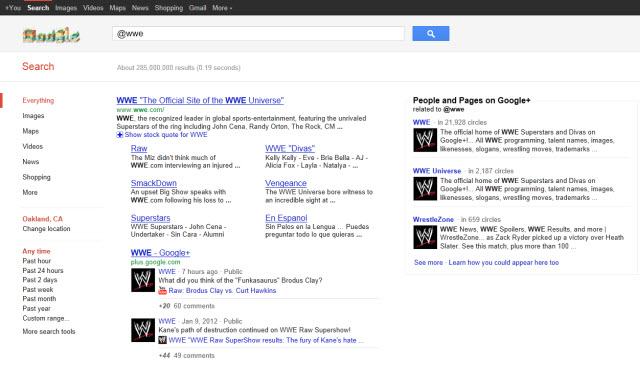
It is no surprise that folks like
Ben Edelman,
Scott Cleland &
Fair Search chimed in with complaints, as this is just a continuation of Google's path. But the complaints came from a far wider cast of characters on this move:
the mainstream press like CNN,
free market evangalists like the Economist,
Google worshipers indoctrinated in their culture who wrote a book on Google &
even ex-Googlers now
call into question Google's transparently self serving nature:
I think Google as an organization has moved on; they’re focussed now on market position, not making the world better. Which makes me sad.
Google is too powerful, too arrogant, too entrenched to be worth our love. Let them defend themselves, I'd rather devote my emotional energy to the upstarts and startups. They deserve our passion.
The FTC's
Google antitrust probe is to
expand to include
a review of Google+ integration in the search results.
Facebook & Twitter
launched a don't be evil plugin named
Focus On The User, which replaces Google+ promotion with promotion of profiles from Facebook& Twitter.
For the top tier broad social networks framing the idea of integrating promotion of their networks directly in the search results is a natural & desirable conclusion, but is that just a convenient answer to the wrong question?
- Whether
Google ranks any particular organic result above the corresponding Bing ranking in Google's now below-the-fold organic results is a bit irrelevant when the above the fold results are almost entirely Google.com. But is the core problem that we are under-representing social media in the search results? According to Compete.com, Facebook & YouTube combine to capture about 16% of all downstream Google clicks. Do we really need to increase that number until the web has a total of 5 websites on it? What benefit do we get out of
a web that is just a couple big walled gardens?
- If Facebook is already getting something like 20% of US pageviews & users are still looking for information elsewhere, doesn't that indicate that they probably desire something else? Absolutely Facebook should rank for Facebook navigational queries, but given
all their
notes
spam, I don't like seeing them in the search results much more than seeing a site like eHow.
- The
he said /
she said
data
deals are also highly irrelevant. What is really needed is further context. Before Google inserted Google+ in their search results
the Google+ social network was far less successful than MySpace (which recently
sold for only $35 million). If social media is added as an annotation to other 3rd party listings then I think that has the opportunity to add valuable context, but where a thin "me too" styled social media post replaces the publisher content it lowers the utility of the search results & wastes searcher's time. Further, when those social media results
are little more than human-powered content scrapers it also destroys the business models of legitimate online publishers.
Over-promotion vs "Search Spam"
At any point
Google can promote one of their new verticals in a prominent location in the search results & if they are anywhere near as good as the market leader eventually they can beat them out of nothing more than the combination of superior search placement, monopoly search marketshare,
account bundling & user laziness. What's more, they can make paid products free and/or partner with competitors 2 through x in an attempt to destroy the business model of anyone they couldn't acquire (talk to Groupon).
Amit Singhal
is obviously a brilliant guy, but I thought some of the answers he gave
during a recent interview by Danny Sullivan were quite evasive & perhaps a bit inauthentic. In particular, ...
- "The overall takeaway that I have in my mind is that people are judging a product and an overall direction that we have in the first two weeks of a launch, where we are producing a product for the long term." If the product wasn't ready for prime time you were not required to mix it directly into the organic search results right off the bat. It could have been placed at the bottom of the search results,
like the "Ask on Google" links were. Bing has been working on social search for 18 months & describes their moves as
"being very conservative."
- "The user feedback we have been getting has been almost the other side of the reaction we’ve seen in the blogosphere." Of course publishers who see their content getting scraped & see the scraped copy outranking the original have a financial incentive to care about a free & automated scraper site displacing their work. They don't get those pageviews, they don't get that referrer data, and they don't get those ad impressions. Google's PR team is
anything but impressed when another company dares do that to Google.
- "The users who have seen this in the wild are liking it, and our initial data analysis is showing the same." Much like the Google Webmaster Tools shows that pages with a +1 in the search results get a higher CTR, this Google+ social stuff also suffers from the same type of sampling bias & giving the listings a larger and more graphical stand out further help them pull in much more clicks.
Any form of visual highlighting & listing differentiation can lift CTR. I might be likely to click on some of my own results more, but when I do so you might just be grabbing a slice of navigational searches I was going to do anyway where I was looking for something else I posted on Google+ or my Google+ account or the account of a friend & so on. Further, aggregate data hides many data points that are counter to the general trend. I have seen instances of branded searches where the #1 organic site was getting a CTR above 70% (it even had organic sitelinks, further indicating it was a navigational search) and for such a search in some cases there were 2 Adwords ads above the organic results & then the Google+ page for a brand outranked the associated brand in the SERPs for those who followed it! That is a terrible user experience, particularly since the + page hasn't even had any activity for months.
- "Every time a real user is getting those results, they really are delighted. Given how personal this product is, you can only judge it based on personal experiences or by aggregate numbers you can observe through click-through." First, publishers are not fake users. Secondly, as mentioned above, there is a sampling bias & the + listings stand out with larger & more graphical listings. If they didn't get a higher CTR that would mean they were *really* irrelevant.
- "out of the gate, whereas we had limited users to train this system with, I’m actually very happy with the outcome of the personal results." They could have been placed at the bottom of the search results or off to the side or some such until there was greater confidence in the training set.
- "People are coming to a conclusion about the product today, within the first two weeks, and they’re not fully seeing the potential where we can build this product around real identities and real relationships." If a publisher promotes a site to the top of the search results & then says something like 'we will improve quality later' they are branded as spammers. In the past Google has justified penalizing a site
based on its old content that no longer exists on the site. Investing in depth, quality & volume is a cycle. If others get prohibited from evolving through the cycles due to algorithms like Panda then it becomes quite hard to compete with a new start up when Google can just insert whatever it wants right near the top & then work on quality after the fact.
- "We don’t think of this as a promotional unit now. This is a place that you would find people with real identities who would be interesting for your queries." If this is the case then why does it only promote Google+?
- "We’re very open to incorporating information from other services, but that needs to be done on terms that wouldn’t change in a short period of time and make our products vanish." The problem is, if a company builds a reputation as a secretive one that clones the work of its partners & customers then people don't want to do open-ended transparent relationships. Naive folks might need to see the blood and tears 3 or 4 times to pick up on the trend, but even the slowest of the slow notice it after a dozen such moves.
- "I’m just very wary of building a product where the terms can be changed." Considering Google's lack of transparency & self-promotional bias on the social networking front, would you be fully transparent and open with Google? If so, then aren't the search algorithms complex enough that it would make sense to make those transparent as well? How can you ask other social networks to increase transparency at the same time Google is locking down their search data on claims of protecting user privacy?
- "It’s not just about content. It’s about identity, and when you start talking about these things and what it takes to build this, the data needed is much more than we can publicly crawl." This is where being trustworthy is so crucial. Past interactions with Yelp, TripAdvisor & Groupon likely make future potential partners more risk adverse & cautious. Outrageous "accidents" like those that happened with Mocality & Open Street Map from playing fast and loose further erode credibility. And even when Google hosts the media & has full access to user data they still rank inferior stuff sometimes (like
the recent Santorum YouTube cartoon fiasco), even on widely searched core/head keywords.
The big issue is that if people feel the game is rigged they won't have much incentive to share on Google+. I largely only share stuff that is irrelevant to tangentially relevant to our business interests & won't share stuff that is directly relevant, because I don't want to be forced to compete against an inferior version of my own work when the deck is stacked so the inferior version wins simply because it is hosted on Google.
As we move into the information age a lot of physical stores are shutting down. Borders went bust last year. Sears announced the closure of many stores. And many of the people shopping in the physical stores that remain
are using cell phones for price comparisons. Given Google's mobile OS share this is another area where they can build trust or burn it. A friend today mentioned how their online prices on Google Product search almost always show a lower price near the header than the lowest price available in the list - sometimes by a substantial margin.
Identity vs Anonymous Contractors
In the past we have mentioned that
transparency is often a self-serving & hypocritical policy by those atop power systems who want to limit the power of those whom they aim to control.
When
Google was caught promoting illegal drug ads there was no individual who took the blame for it. When the Mocality scraping & the Open Street Map vandalism issues happened, all that we were told was that Google "was mortified" and it was "a contractor." If people who did hit jobs could just place all the blame on "the contractor" then the world would be a pretty crappy place!
Eric Schmidt
warned that "If you have something that you don't want anyone to know, maybe you shouldn't be doing it in the first place." That sage advice came from the same Eric Schmidt
that blackballed cNet for positing personal information about him. Around the same time Eric offered the above quote,
Google was engaged in secret & illegal backdoor deals with direct competitors to harm their own employees.
What happened to Google recruiters who dared to go against the illegal pact?
They were fired on the hour:
"Can you get this stopped and let me know why this is happening?" Schmidt wrote.
Google's staffing director responded that the employee who contacted the Apple engineer "will be terminated within the hour."
When Google+ launched they demanded that you use your real name
or don't use the product. They later claimed that
you can use a nickname on your account as well, but
there is a difference between a nickname and pseudonyms.
What is so outrageous about the claims for this need for real identities is that past studies have shown that
pseudonymous comments are best & Bruce Schneier highlighted how we lose our individuality
if we are under an ever-watchful eye:
Cardinal Richelieu understood the value of surveillance when he famously said, "If one would give me six lines written by the hand of the most honest man, I would find something in them to have him hanged." Watch someone long enough, and you'll find something to arrest -- or just blackmail -- with. Privacy is important because without it, surveillance information will be abused: to peep, to sell to marketers and to spy on political enemies -- whoever they happen to be at the time.
Privacy protects us from abuses by those in power, even if we're doing nothing wrong at the time of surveillance.
In many markets
ads and content are blended in a way that is hard to distingush between them. Whenever Google wants to enter
they can demand greater
transparency
to participate (and then use the standard formatted data from that transparency to create a meta-competitor in the market.)
Increasingly Google is placing
more of their search data & their webmaster-related functions
behind a registration wall.
If you are rich & powerful they will
sell you the data. If you are
the wrong type of webmaster that aggregate data can be used
in *exceptionally* personal ways.
User Privacy
Ahead of Google updating their privacy policy Google has directed a large portion of their ad budget toward ads about
how they protect users online.
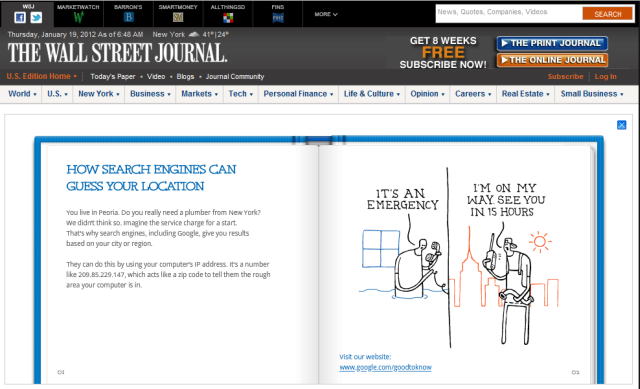
What better way to ensure user privacy than to allow them to register their accounts under psydonyms? The real name policy on Google+ was part of what made Google want to stop providing referrer data for logged in users who search on Google. This has had a knock on effect where other social sites are
framing everything,
requiring registration to read more of public user generated content &
sending outbound traffic through redirects.
Google's
new
privacy policy allows them to
blend your user data from one service into refining the experience (and ads) on another:
If you’re signed into Google, we can do things like suggest search queries – or tailor your search results – based on the interests you’ve expressed in Google+, Gmail, and YouTube. We’ll better understand which version of Pink or Jaguar you’re searching for and get you those results faster.
Google & Facebook's
war (against) user privacy is catching
media and
governmental attention. Microsoft highlighted some of Google's issues in
their "putting people first" ad campaign & the blowback has caused Google not only to publish PR-spin
"get the facts" styled blog posts, but to launch
yet another ad campaign.
EU regulators have asked Google to
pause their privacy policy changes.
Bogus Testimonials & Social Payola
Is social media a cleaner signal than links? If search engines put the same weight on social media that they put on links it would get spammed to bits. It won't be long until a firm like Ad.ly offers sponsored Google+ posts.
Some have suggested that
you won't be able to buy Google+ followers however Google already includes user pictures on AdWords ads (even when they desire not to be &
even when they didn't endorse the product that Google suggests they endorsed). In due time I expect Google will indeed sell followers & other user interactions as ad units (just like Twitter & Facebook do).
Further, celebrities
sell Tweets to advertisers. When they are hot
their rates go up:
When Ad.ly introduced self-destructing Charlie Sheen to Twitter, he was paid about $50,000 per tweet. It was worth it. Sheen’s tweet for Internships.com generated 95,333 clicks in the first hour and 450,000 clicks in 48 hours, created a worldwide trending topic out of #tigerbloodintern, attracted 82,148 internship applications from 181 countries, and added 1 million additional visits to Internships.com.
Search engines might consider these to be clean signals if those same search engines were not busy buying the manipulation of said "relevancy" signals.


Attention is purchased to create demand. It isn't comfortable to put it this way, but we are trained to obey authority &
to like what
others like:
The average Facebook user has 130 friends, which equates with four degrees of separation to thousands of people, Mr. Fischer said. Metrics like that led him to believe that if Facebook could figure out a way to capitalize on "social endorsements," it would be like creating a word-of-mouth campaign that could reach millions of people simultaneously. Since the campaigns would come from a friend, they would theoretically be taken more seriously than, say, a TV commercial, he said.
On an individual basis
reviews and
ratings get faked everywhere. Even stodgy old slow-moving institutions like colleges
game their ranking systems.
There recently was a question raised about
how Google's rating systems skewed high on the underlying data. Surely Overstock (the same Overstock Google penalized earlier this year) wouldn't promote Google's trusted stores aggressively on their own site if it made their business appear worse than it actually is, thus a positive bias must be baked in to the system.
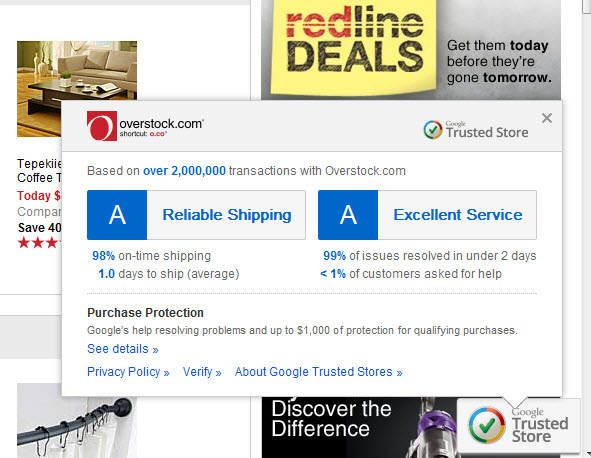
Entire categories of demand are created by those
tied in
with power cost shifting to create bubbles. The federal reserve helped spark a real estate bubble with low interest rates.
FBI warnings of mortgage fraud were ignored. Consumers were constantly fed propaganda about "real estate only goes up." Then when that bubble popped, the US government bailed out those who caused it & burned trillions of Dollars propping up home prices. The government even bailed out a company that is
now shorting the housing market (when that company was about to get bailed out
the secretary of treasury leaked that material non-public information to some of his criminal investor buddies).
Does all the above sound circular, conflicting, corrupt & confusing? It should, because that is how power works & comes off as seeming semi-legitimate when acting in illigitimate ways. The
perception of
reality is
warped to create profitable opportunties that are monetized on the way up and the way down.
Millions of kids take drugs that
address the symptoms of being a child full of energy, imagination & entusiasm.
In some cases they may need them, but in most cases they probably don't. The solution with the highest economic return gets the largest ad budget, even if it only treats symptoms.
Web Scrape Plus+ (Now With More Scraping)
When the +1 button & Google+ launched, Google highlighted
how they would use the + button usage as a "relevancy" signal. Google recently started
inserting + pages directly into the search results for brands & right from the very start
they were using it as a scraper website that would outrank the original content source.
Google used the buy in from their promised relevancy signal to create
a badge-based incentivized system which acts as a glorified PageRank funnel to further juice the rankings of these new pages on a domain name that already had a PageRank 10.
I recently read a blog post about
how anyone could do the above & the opportunity is open to everyone. But the truth is, I can't state that something will become a relevancy signal that manipulates the search results in order to get buy in. Or, if I did something which actually had the same net effect, Google would likely chop my legs off for promoting a link scheme.
Recently the topic of Google+ as a scraper site came up yet again
via Read Write Web & on Hacker News a Googler stated that
it was "childish" to place any of the blame on Google!!!!!!
Google determines
how much information is shown near each listing & can create "relevancy" signals in ways that
things tied to Google get over-represented (
look at the +1 count here). When they do that & it destroys other business models *of course*
Google deserves
100% of the blame.
Thin Content & Scraper Sites
Remember the whole justification for Panda was that thin content was a poor user experience?
In spite of sites like eHow getting hit,
Google is still pre-paying them to upload content to Youtube.
Now that the (non-Google hosted) thin content has been disappeared (
and the % of downstream traffic from Google to Youtube has more then doubled in the past year) it is time for Google to take another slice of the search traffic stream with
Search Plus Your World:
The Google vs Facebook locked down walled garden contest will retard innovation. As the corporate internet silos grow larger
the independent web withers. Them going after each other may leave room for Twitter, but
it doesn't leave lots of room is left for others, as
the economics of publishing have to work or the publishers die.
Start ups that were on a successful trajectory
were killed by Panda:
The startup had been on a roll up until last February when Google altered its ranking algorithm with the release of “Panda.” The changes decimated TeachStreet’s traffic, and the company never quite recovered.
“We lost a lot of our traffic, and overnight we started talking to partners for biz dev, not for acquisition,” he said. However, many of the potential partners wanted to know about an outright acquisition.
About.com
was also smoked by Google:
The biggest worry, though, is that the decline of About.com itself may be irreversible. Fewer people are clicking on About ads placed by Google and the site’s own display ads have dropped in value.
The company has attributed this decline in value to Google’s decision last year to downgrade About pages in its search results. With more than 80% of traffic coming from search, the Google denigration was indeed a blow but About’s problems may be rooted in something deeper.
Keep in mind that the reason these websites were hit was that they were claimed to be thin & thus a poor user experience. When the NYT bought About.com one of the top competing bidders
was Google!
Now that the "thin content" has been demoted in the search results Google can integrate deep content silos from Google+, like this one:
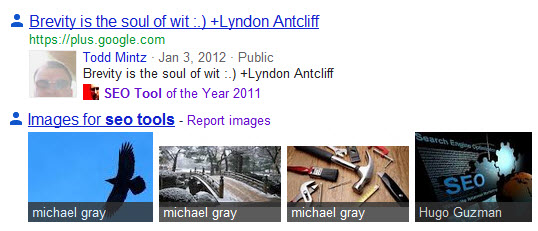
That is an 8-word Google+ post about how short another blog post is. I like Todd & do like to read his writings, but here Google is clearly favoring the same sort of content they would have torched if it was done on an independent webmaster's website.
How Google has raters view other websites that redirect traffic is based upon those sites having a substantial value add. Clearly in the above example there was nothing added to the interaction beyond sharing a bookmark with a punchy tagline.
If Google wants to use the + notation to pull up that other referenced page then perhaps that can make sense, but to list an 8-word Google+ page in the search results nearly a year after the Panda algorithm is outrageous. This sort of casual mention integration in the search results occurs on expensive keywords as well. Not only do they list your own Google+ posts...

...but they also list them from anyone you follow...
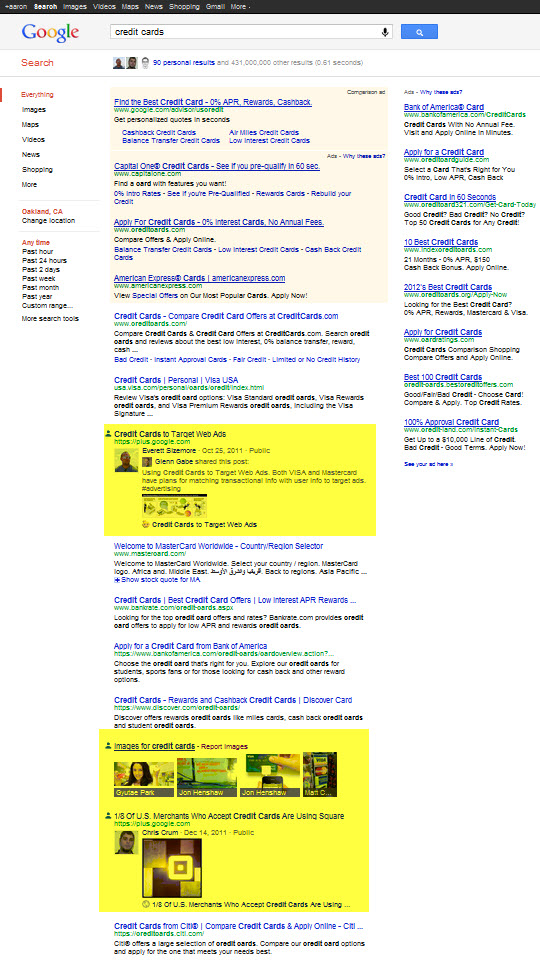
In addition to information pollution, the other big issue here is time. Google wants to make forms more standardized
to make filling them out faster &
they give regular sermons on the importance of fast search results. Yet when I do a navigational search, Google delivers two AdWords ads, a huge Google+ promotion, and then the navigational search result barely above the fold.*
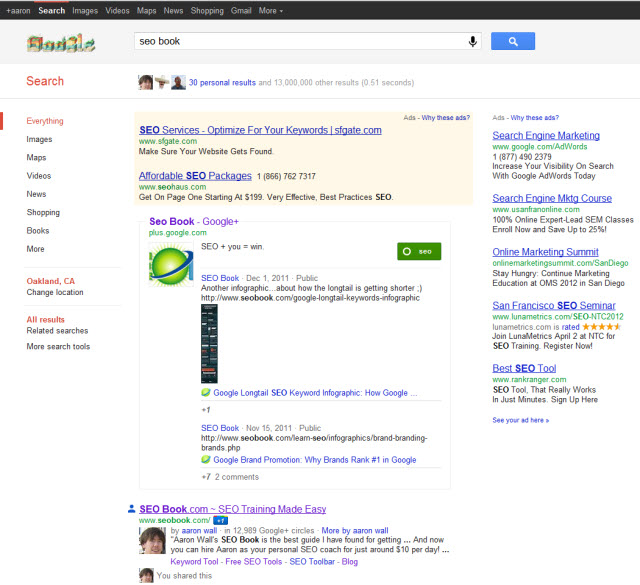
*Since I thought the above was obnoxious, I renamed our Google+ company page to
S_E_O Book
to help Google fix their relevancy problems.
Can anyone explain how Google's speed bias is aligned with putting plus junk right at the top, even on brand searches? Yahoo! has been pretty aggressive with putting shopping ads in the search results, but their implementation is still a better user experience than what Google did above.
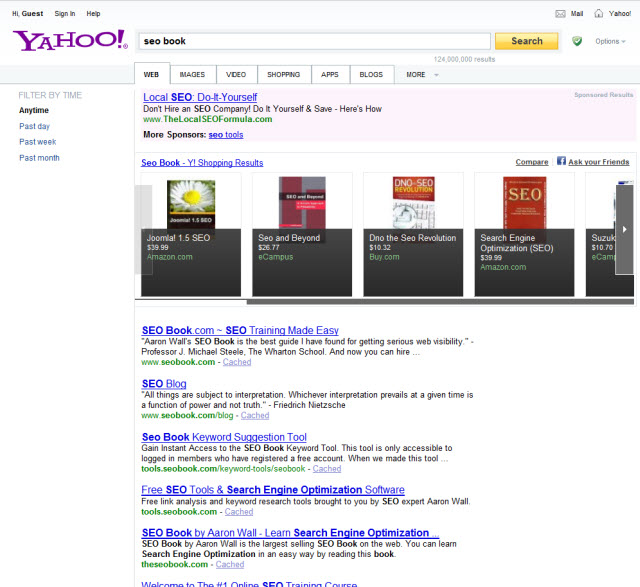
And Bing offers an even cleaner experience than that.
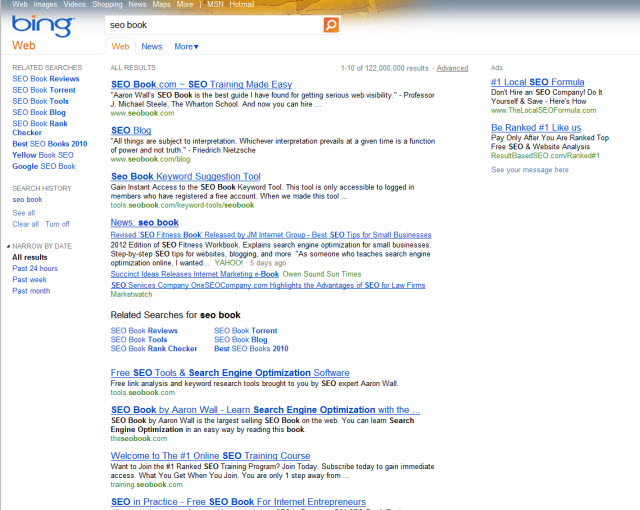
Due to
how Google integrates Google+ in such a parasitic way I see
no incentive for participating on their network except when I have something that is outside of my domain of expertise, something that I am not targeting commercially, something that is thin, or something irrelevant to say! That incentive structure combined with
Google's photo meme feature will ensure that
content marketers will help plenty of people see Star Wars stuff ranking for
mortgage loan
search queries.
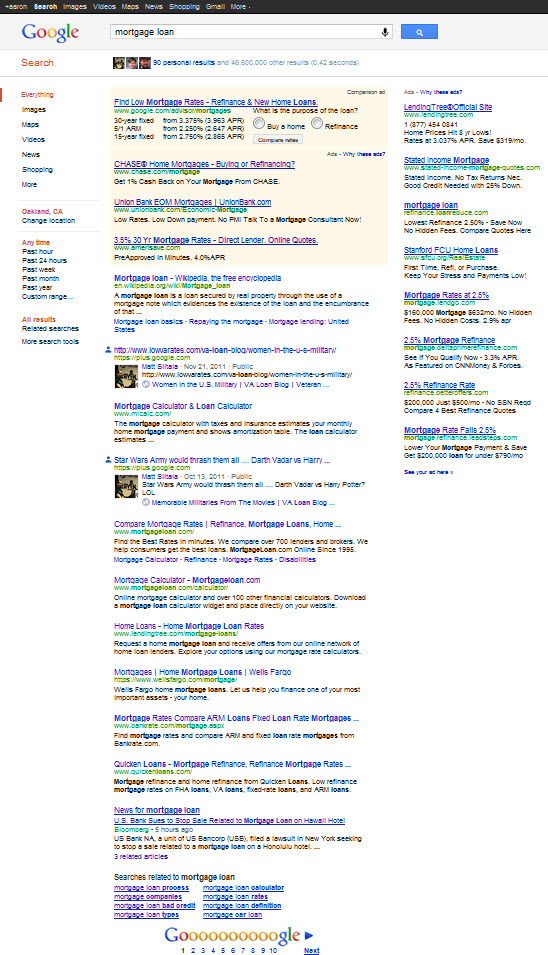
When you own search/navigation you own language. that position can easily be extended into any other direction/market
in a way a social graph can not:
"The only technology I’d rather own than Windows would be English," McNealy said. "All of those who use English would have to pay me a couple hundred dollars a year just for the right to speak English. And then I can charge you upgrades when I add new alphabet characters like ‘n’ and ‘t.’ It would be a wonderful business."
Further, Google can chose at any point to
respond to or
ignore market regulations in accordance with whatever makes them the most money. They can also fund 3rd parties doing the same (
like undermining copyright) to force others to strike an official deal with Google to be "open."
A lot of businesses live on small profit margins, so Google's ability to insert itself & fund criminal 3rd parties aligned with Google's internal longterm interests is a big big big deal. Companies will learn that you either work with Google on Google's terms or you die.
When a public relations issue brews they can
quickly change their approach and again position themselves as the white knight.
Brand Equity & Forcing the Brand Buy
Yahoo! put out
a research paper highlighting activity bias, stating that the efficacy of online advertising is often over-stated because people who see ads about a topic were already more closely tied in with that particular network & that particular topic before they even saw the ad. As an example, any person who sees an AdWords ad for
hemorrhoid treatment
was already searching for hemorrhoid-related topics before they saw your ad (thus they were in the subset of individuals that might have came across your site in some way if you were in the search ad ecosystem or not).
This sort of activity bias-driven selection bias (homophily) exists on social networks
online &
offline.
Google did
research on incrementality of ads & they came to the opposite conclusion as Yahoo! did. Google suggested you should buy, buy, buy, even on your own branded keywords. They suggested that testing was expensive (no mention that the only reason it is expensive is because Google chooses not to make such tools easily accessible to advertisers) & that the clicks were so cheap on branded keywords that you should buy, buy, buy. Many advertisers who mix brand & non-brand keywords together don't realize that
they are using the "returns" from bidding on their own brand to subsidize over-paying for other keywords.
Google Analytics is the leading & most widely used web analytics program. They can share
whatever metrics help them sell more ads (defaulting to crediting the last click for conversions, even if it was on a navigational search to your site) & pull back on features that are not aligned with their business interests (SEO referral data anyone?)
This goes back to
Scott McNealy's quote: "The only technology I’d rather own than Windows would be English. All of those who use English would have to pay me a couple hundred dollars a year just for the right to speak English. And then I can charge you upgrades when I add new alphabet characters like ‘n’ and ‘t.’ It would be a wonderful business."
Analysts
didn't understand why
Google CPC rates were down 8%
last quarter while overall search clicks were up 34%. The biggest single reason was likely more clicks on adlinks on branded AdWords ads. While a brand buying its own keyword typically pays far less per click than
what some of the biggest keywords go for, the branded keywords typically have an exceptionally high CTR.
Those additional clicks dragged down Google's average CPC, but the extra revenue they offered was a big par of the reason why Google was about to grow at 25% even though their display network only grew at 15%.
That slow growth of display is in spite of Youtube now serving over 4 billion video streams per day & Google adding display ads to log out pages.
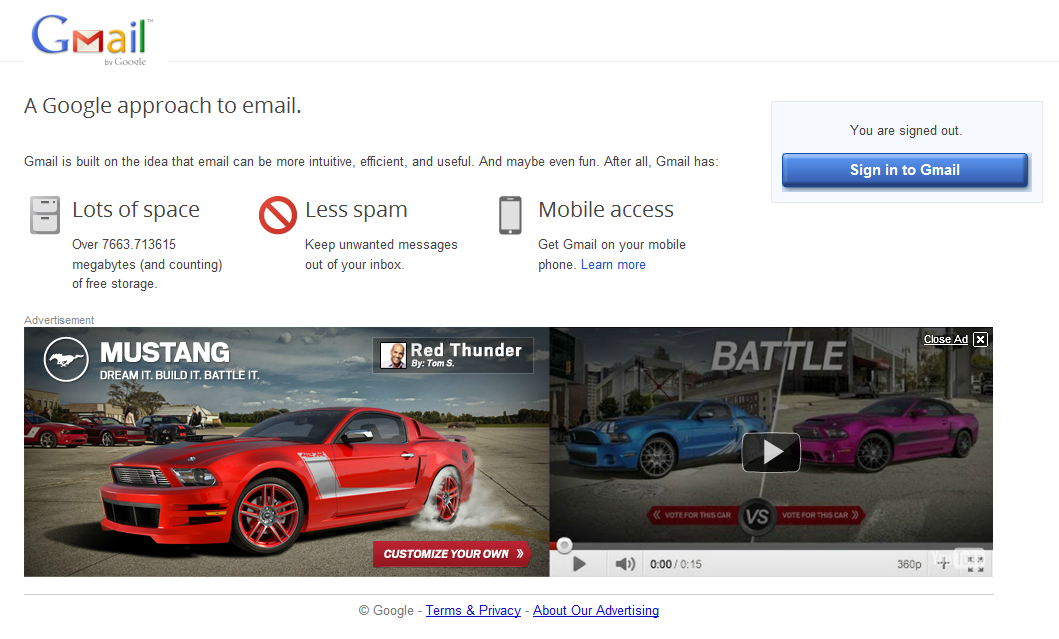
Online views
are not the same as TV views. A comScore study found that
31% of display ads are never seen. In spite of that, US online advertising will
reach nearly $40 billion this year.
Google wants to insert itself as a needed cost of business in the same way
credit card companies have.
On Google Maps they put an ad inside your location box.
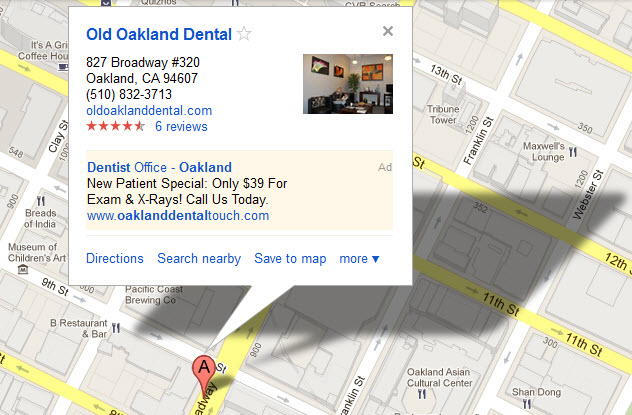
Even if
most people don't participate on Google+, Google can
still force advertiser buy in through over-promotion of the network in the search results. On your branded keywords they may drive your organic listing below the fold & put Google+ front & center.

Facebook earnings
are still growing much faster than Google's & Facebook encourages advertisers to
advertise their Facebook pages, so even when you pay for the click Facebook still keeps the user. Facebook is
adding apps to the timeline &
is trying to win VEVO music video hosting from YouTube.
While Google is primarily known as a search company, it is getting harder to get off of Google though any channel other than a toll booth. Google keeps
driving the organic search results downward, while Google verticals fill up many of the organic results that remain. Many companies already buy Google ads on their own YouTube content. Some buy ads on Google to drive them to their Youtube videos & then buy ads on their own Youtube video to promote their websites. Soon Google will try to push you to buy them on your Google+ page as well.
Google is becoming a walled garden:
Google wants to control more elements of your social world now. They don’t just want to be a search engine.
Is that so bad? Maybe not. It’s certainly no different from how other companies, from AOL, to Microsoft, to Apple, to Disney, to Facebook, have viewed the world — as ideally a walled garden, an all-consuming platform that most people use for pretty much every form of entertainment and social interaction.
A lot of people thought that Google was somehow different. They were, of course, wrong.
...
To move forward either as the old Google or Google+, Google needs to be capable of making fair deals with the partner ecosystem. It needs to curb its instinct to kill competing media companies that were actually producing great content that Google helped you find.
I suspect there will be plenty of bloodshed before Google figures that one out.
"This is the path we’re headed down – a single unified, ‘beautiful’ product across everything. If you don’t get that, then you should probably work somewhere else." -
Larry Page
Google no longer believes in the concept of the open web. Blame it on Larry Page becoming the CEO, blame it on him talking to Steve Jobs & Steve telling him to make fewer and tighter products, blame it on Google funding eHow, or blame it on basically anything. But if you go back far enough, much of the stuff that is going on now
was clearly envisioned a decade ago:
I was lucky enough to chat with Larry one-to- one about his expectations for Google back in 2002. He laid out far-reaching views that had nothing to do with short-term revenue goals, but raised questions about how Google would anticipate the day sensors and memory became so cheap that individuals would record every moment of their lives. He wondered how Google could become like a better version of the RIAA - not just a mediator of digital music licensing - but a marketplace for fair distribution of all forms of digitized content. I left that meeting with a sense that Larry was thinking far more deeply about the future than I was, and I was convinced he would play a large role in shaping it. I would rather jump on board that bullet train than ride a local that never missed a revenue stop but never." - Douglas Edwards
What happens when the Google+ version of your content outranks the version on your own site? And what happens when your branded channel and/or your fans become a vertical ad silo Google sells to your competitors?
I tested submitting a couple posts to Google+ with a Wordtracker top keywords list & valuable keywords (on a cpc*traffic) basis in posts about top keywords. Those posts rank #2 or #3 in Google for many people that follows me. No harm to me since those posts were irrelevant to this site, but if they were about my theme & topic I just would have out-competed myself. When Google outranks you (even with a copy of your content) they get to taste the data again and sell off the attention another time. You only get a slice of that monetization, even when it is your work that is being monetized. Maybe it is great for stuff that is somewhat less relevant and/or keywords that are so competitive that you otherwise wouldn't score for them, but we have to be really careful we don't out-compete ourselves. Though if Googke keeps this up they won't be the only ones monetizing it. Give it a few months and celebrities will be selling sponsored Google+ posts based on some metric created by multiplying search volume, CPC & how many followers they have.
Is Bing Better? Will Enough People Ask That Question to Matter?
For years Google built their reputation as being the search engine that offered the cleanest & fastest search results. They were known for monetizing less aggressively than the competition. But over the past couple years
Google has dialed up their ads to where
they now send a greater ratio of ad traffic than organic search traffic. One Google engineer recently described the ability to rank highly in Google without buying their ads as
being a bug that was getting fixed!
Google's big risk in their coupling of aggressive monetization,
aggressive self-promotion & changing how users feel about user privacy is that they can create the perception that users should go elsewhere for for an honest or trustworthy search. This not only builds momentum for smaller search services like
DuckDuckGo &
Blekko, but has also won praise for Bing from
Gizmodo,
Dave Winer &
The Next Web.
The first novel from Newsnight's economics editor is an enjoyable romp through China
It's a conspiracy theorist's dream. One nation holds most of the planet's supply of "rare earths", the metals and alloys key to building many of the developed world's must-have items, including mobile phones, computers, cameras and precision missiles. And that country happens to be China: the world's last great bastion of communism (if you don't count its basket-case dependent, North Korea) and for centuries the focus of western fear, loathing and grudging admiration. This is the dramatic factual premise behind this febrile but enjoyable first novel by
Paul Mason,
Newsnight
's economics editor.
A paunchy middle-aged reporter called Brough – "a has-been hack with a Yorkshire accent" reeking of whisky – washes up in deep northwest China in May 2009, to make a documentary about the state of the Chinese environment. He is accompanied by his producer, Georgina, a ruthless blonde alumna of Cheltenham Ladies College desperate to swing a Chinese television distribution deal; by an even more washed-up cameraman called Carstairs; and by Chun-Li, their enigmatic Chinese interpreter. After an afternoon filming townspeople sick from factory pollution, the crew is arrested and barely escapes an assassination attempt by a crazed underling from the local propaganda office.
While Brough fakes his own death and flees into the Gobi Desert, Chun-Li (a freelance spy, we learn) promptly dopes a psychotic Mongolian sex maniac with Russian truth-drug, and discovers the area is ruled by a cartel – half-gangster, half-government – that has enriched itself on illegal mining of rare earths.
Brough, meanwhile, is kidnapped by a motorbike gang of paramilitary fashionistas called the Steel Fuchsias, all of whom are both fervent believers in the full operation of market forces and staunch supporters of the Communist party. He eventually escapes to a forced-labour camp inhabited by political prisoners riddled with mining-related cancers, and learns for himself about the rare earth racket. Throughout, Chun-Li and Brough are pursued across the Gobi by a thuggish police superintendant, while Brough's efforts to get the story down on film are frustrated by business-conscious Georgina's desire for a whitewash documentary to keep her official Chinese media contacts sweet.
All of this is imagined, of course. "I wrote
Rare Earth
," Mason says, "because I got tired of trying to tell the China story as fact – with so much of the political reality hidden from view, it would be easier to tell it as fiction." For sure, there's a good deal of silliness amid the invention. Reading the passages rich in masochistic sex, you easily imagine Mason joyfully kicking free of BBC fact-checkers. Challenged about some of the book's fruitier scenes, Mason has
shrugged his shoulders: his characters "just became real and started mating with each other". But as a warning to anyone questioning his authenticity, he has also threatened to make public "the academic source literature for Mongolian horseback sex. It exists." This reviewer is willing to take that episode on trust.
But given that the book was apparently written on the back of one
Newsnight
research trip to China in 2009, Mason's thriller-parody also manages a respectable sprinkling of insights into the country. The Steel Fuchsias are a burlesque of the fervent party loyalty observed in some of China's most privileged, internationalised youth today. Contemporary China, one of Mason's protagonists remarks acutely, has recreated the late Qing dynasty, which toppled a century ago: "Whole swaths of China are ungoverned: ruled by mobsters and corrupt officials … At the centre is a walled palace, only it's not the Forbidden City, it's the Communist party HQ."
There are entertaining jokes and smart, no-nonsense descriptions: air "baked by blast furnaces and hung heavy with the odour of coal and gasoline; the odour of 9.9% GDP growth". It's hard to decide who comes off worst in the book: the greedy party apparatchiks wallowing in small-town massage parlours, or the opportunistic western TV executives ensconced in their five-star Beijing hotels. Although Mason has clearly relished his liberating foray into fiction, the discipline of years observing the BBC charter's stipulation on balanced reporting has left its mark on
Rare Earth
.
• Julia Lovell's
The Opium War: Drugs, Dreams and the Making of China
is published by Picador. To order
Rare Earth
go to
www.orbooks.com
Terms & Conditions |
More Feeds

Police in Winnipeg say a series of raids Friday morning are part of an ongoing investigation that has led to the seizure of $1 million worth of illegal drugs, seven arrests and six warrants for arrest.
What should the Occupy movement do, after the occupations? The author and activist joined us for a live webchat
In her column earlier this week, author and activist Naomi Wolf wrote about her hopes and fears for the Occupy movement, now that it has been evicted from most of its visible manifestations:
"Occupy – a movement I love and respect, and which represents our last best hope – also fills me with distress because of how difficult it is for a movement committed to "no spokespeople" to get their message out."
She suggests that there are valuable lessons to be learned from a series of powerful documentaries, recently screened at the Sundance Film Festival, about protest movements of the recent past. Her conclusion is that for Occupy to keep its momentum now, it can no longer afford to be such an amorphous, anarchic movement. In effect, it needs to get organised, in more conventional campaigning ways.
Media exposure, a clear message, smart soundbites, clearly stated demands, and, most importantly, tasked, empowered negotiators working on the inside in concert with mass disrupters applying pressure from without – this equals political life.
Do you agree this is the way forward for Occupy? Has its moment already passed – if so, what has it achieved? How do you see its future?
The webchat is now at an end, but commenting will remain open to discuss issues raised. Thanks for your interest and participation.
What do you think about the lack of cooperation between the American centred Occupy movement and the European/global Take The Square and Democracia Real Ya networks? (As exemplified by the recent OWS plan for a 'global strike' on the 1st May despite TTS' plan for the same action on the 15th May). Do you think the message of "real democracy now" of the DRY/Indignados movement has been lost in the Americocentric Occupy movement?
Naomi Wolf responds:
I think that this was probably due to people working two jobs, being overscheduled etc rather than any strategy.But it certainly goes to the need for a good strong global Occupy communications hub. We are also really in a media bubble here and miss a lot of globali nformation. I have heard a rumor of new global Occupy communications hubs being created and promise to report as they emerge.
Why do you want to turn Occupy into a same-same safe liberal professionalized and institutional political movement?
Naomi Wolf responds:
Well, if this is the impression you have of what I am saying either I was not clear enough or you may be misreading me. Act Up was NOT SAFE.They were highly confrontaional, they did things like lie down in churches and shout 'murderer' -- they threw the ASHES of their loved ones over the White House fence and brought a DEAD leader in his COFFIN to the republican campaign headquarters. They were radical and cnfrontational but they were also highly organized and on message and did not see a problem with talking to the media to get their message across. Gandhi too was radical, MLK too -- same thing.
Also: if I urgently (to the point of being annoying) keep pleading with Occupy (and ding what I can in postingmedia training, going to ZuccottiPark to give media training etc) to addmessaging, any number of spokespeople (it can be zillions!) and agenda items (they can change!) to their practice, it is because I do not believe we have the luxury of time for the movement to'find its feet'or even maybe behave in ways that might be most comfortable for it. I believe the powers that be will start cracking down in ways we cannot even imagine even in advanced democracies -- they will use baton rounds on Occupy London they have PROMISED, and those killed people in Northern Ireland -- and that in ourlimited time to act to stabilize democracy and get the people's voices heard, we have to take drastic action that may not be comfortable for everyone but that history shows WORKS. I aldso disagree that clear messaging is 'liberal', MLK is the most lucid writer and speaker in US history.
The top 1% pay just under 40% of all federal taxes, and the top 10% pay 70% of them. In Britain, the top 1% pays 25% (with a higher tax rate) and the top 10% pays 50%. Why does Occupy think that the rich do not pay their fair share when the tax and spend system of government is almost exclusively reliant on the rich to fund social welfare programmes? I know it's pointless to have cake and not eat it, but aren't you guilty of trying to?
Naomi Wolf responds:
Well you are leavig out an im[ortant part of the math, which is the amount of wealth the one per cent own -- in the US thetop ten per cent own the MAJORITY of the wealth. So the issues is proportionate taxation. Also cporporations in the US and I believe increasingly the UK are as I wrote cycling their profits offshore, perfectly legally, so that corporations like GE and FedEx that make vast profits pay often zero or less than one per cent.
Naomi, thinking especially of the States, Canada, and Europe, are there any organizations (e.g., faith-based organizations or NGOs) that you believe might serve as powerful allies for the various "Occupy" movements; in particular, for helping to communicate key messages?
Naomi Wolf responds:
Great question. I think radical Christians and Catholics are naturals -- liberationn theology is right up there with this message -- but many Tea Partiers and Libertarians are also worried about liberty issues and crackdowns on constututional rights -- the beauty of liberty and economic justice movement is that it can have alliances across -political segments if only we learn the power of coalition-building --ie tea patrtietrs and Occupy can unite today to push backagainst the NDAA (whic gives the US the right to detain people forever) but don't have to agree down the line on other issues....
Does Ms. Wolf think that it'd be a good idea for one of the key questions that the Occupy Movement to ask more focefully is whether, on a finite planet, the goal of society (both left and right) should be continued economic growth?
Naomi Wolf responds:
I think they (like any citizen) should ask whatever they wish but THAT is a radical and crucial question in my opinion. And even MORE than most needs good explainers.
Seems that OWS is embracing some rather no-traditional and novel foundations. This is a great departure from more traditional Youth Movements, yet retains the same fervor and purpose. I find it very unique. Are the traditional (nee Victorian) ideas of Social Change Through the Guidance of Leadership no longer relevant?
Naomi Wolf responds:
great question again, but ;et me be super clear because I think this is ahard paradigm to wrap our brains around collectively. The top-down 'leader and strategy' is DEAD. But the new world requires that EVERYONE be a leader, ready to speak and write and lobby, and you can have a movement with a million leaders but a voting process that lets everyone have input into then ADOPT a clear agenda that changes over time according to new input. You can get there through majority voting not consensus. That is not top-down strategy it is democracy.
I think the occupy movement should support candidates from parties other than the two headed corporate duopoly of Dems/Repubs. Just by getting them more coverage, wouldn't that create more options going forward for real change? For example: I'd like to see the Justice Party's Rocky Anderson and the Green Party's Dr. Jill Stein included in the Presidential debates. How could we make that happen, and how can occupy help gain positive attention for new parties/candidates that aren't bought and sold by the one percent?
Naomi Wolf responds:
So here we see that as we discuss this, GREAT agenda items get brought forward. Great thinnking: so they might say 'you start it'. If you wanted to push a third party candidate the best way is tofollow the steps in the last section of Give Me Liberty (my publishers released it for free on PDF): you would register voters, build support and write op eds for the media. Re press attention the best thing is to BE the media -- write press releases, write op eds and blogs, post your own campaign commercials -- social media (till it is outlawed very soon, judging from recentlegislation like Acta) make that easy. Or run yourself! GML shows you how.
A more general question: you mention wealth, and the fact it is poorly distributed. The distribution bit is hard to argue but at a high level how do you tax wealth? It really isn't a simple question to answer.
Naomi Wolf responds:
Hm. well wealthy people earn lots of their income on capital gains, which are taxed less than the wages that most working people earn. That seems unfair to me. Romney paid I think ten per cent on his millions cause of this, but i as a self-employed person with way less money am taxed at a much higher rate. Some people in the US call for a flat tax for this reason. These are all worth discussing but a movement like occupy ideally can make real space for real discussio -- these options are off the tanble now because of corporate influence on most media and politicians.
One of the main problems Occupy faces is public perception. On forums, discussion threads, even radio shows, the main image of Occupy appears to be that they're a bunch of unwashed, lazy benefit scroungers and trustafarians.
This image, of course, is not correct and slightly unfair, but so long as the general public believe this to be the truth, it's easy to not take the movement seriously.
With that in mind, should one of the first steps forward be to show the public that Occupiers come from all different backgrounds, cultures, ages, and different levels of education and employment?
Naomi Wolf responds:
Hooray for this great question too! In an electronic world appearance affects reality and yes this 'image'is not ideal. That is why if you have hundreds or thousands of trained spokepeople we will see -- the housewife, the military guy, the retiredperson etc etc and the scruffy hippie...the face of everyone. But also the civil rights movement told marchers to wear suits and the ladies dresses, gloves and hats for a reason -- it is important to communicate respect for the chance to protest and respect for the chance to speak to one's fellow citizens. People can be "themselves"while still presentig themselves in a way that does not let their opponents write them off. Act Up often wore suits when they disrupted FDA hearings and it was a better visual than torn jeans.
I totally agree that Occupy needs clearer messaging to win over non-protesters. I read on wikipedia that the founders wanted it to be the Tobin tax. I don't think that goes very far... what do you think this message might be? Higher taxation? How do you get around the political challenges of this?
Naomi Wolf responds:
I would not want to dictate -- but again let's look at Act Up. They constantly changed their messaging and agenda to address what was nbeeded -- more drug trials, better care for people with AIDS, cheaper drugs in Africa, etc etc etc. But AIDS was theeir umbrella. Occupy's "Umbrella" seems to be inequality and corporate overweening influence society -- I would hope adding freedom is a natural. So week by week they should be --at a local and also a national and international level -- chossing ONE item to address with ONE concrete goal and creating actions to demand it and raise its profile.
Naomi, for those Americans who grasp the magnitude of danger to freedom our current path holds but feel powerless to stop it, please advise. What action steps can we take, especially those with no physical Occupation to seek out, or finding the movement too slow to respond with the necessary outcry?
Also, some have argued that extreme stances taken by Occupy alienate would-be members. The city of Oakland has called for other Occupy groups to denounce Oakland Occupy as inappropriately violent after clashes with police. Is this an appropriate request or would this push the movement in the wrong direction?
Naomi Wolf responds:
Yet another imortant question. It is CRUCIAL for any citizen movement to renounce violence and you can be sure that violence is used against movements. Violence is always counterprodiuctive. The best thing you can do is ORGANIZE -- become a 'democracy team' -- register voters and put pressure on your representatives'district rep (ask for a meeting) to push back on liberty issues and you will get out the vote (in congressional elections which everyone ignores) or promise to take your list elsewhere (politely) ifnot. These have to be registered vioters who vote in congresisonal elections -- they know. This way you become a democracy 'power user'and my campaign mentor Curtis Ellis says that this gives any citizen the power of a lobbyist. THEN you have to make it fun -- have amonthly pot luck for your registered voters to plan the next meeting and what you will demand -- because movements burn out without community and fun -- i love the slogan give me bread but give me roses.
Final word from Naomi:
Thank you all so much for this great discussion! I have heard on
my FB page, while we were talking, from Occupies reporting that they are well-attended and well-organized in various cities around the world – so I will ask them to send me op eds about their agendas and their actions and I will shine the light I can on them periodically! Thank you again.
Terms & Conditions |
More Feeds
Merlin
Democratic Republic of the Congo (the)
16 Feb 2012
Programme: Democratic Republic of Congo, N Kivu Responsible To: Provincial Director (PD) Responsible For: All Provincial Finance Team Works With: Country Support Director in Goma, Financial Advisor in London, Operations Manager (N Kivu) Location: Goma, DRC with extensive travel to field sites in N Kivu Start Date: ASAP Duration: 4 months Salary and Benefits: ?33,480 - ?34,230 per annum per annum (dependant on relevant experience), inclusive of annual Cost of Living Allowance Benefits: Insurance cover, accommodation, annual leave entitlement of 24 days per annum rising to 30 days at the completion of 12 months of continuous employment with Merlin.
Only short-listed applicants will be contacted. Due to the urgency of this position, applications will be short-listed on a regular basis and we may offer this post before the closing date.
Please note that an assessment will need to be carried out to confirm if this position can be accompanied.
Merlin Undaunted and determined, Merlin saves lives. We deliver medical expertise to the toughest places. And we stay to help build lasting health care.
Our mission is to end the needless loss of life in the poorest countries caused by a lack of effective health care. We help communities set up medical services for the long term including hospitals, clinics, surgeries and training for nurses and other health workers.
We do whatever it takes and we stay for as long as it takes.
Context and Background The Democratic Republic of Congo is the second largest country in Africa and one of the poorest. Decades of dictatorship and civil war have left much of the national infrastructure destroyed.
Merlin has been operational in DRC since 1997. Merlin teams have provided emergency medical care to the most vulnerable populations in Maniema, Kasai Oriental , North Kivu and Orientale Provinces. Activities have included emergency response, support to primary and secondary health care facilities (including supervision, supply of drugs, and the payment of incentives), reproductive health, institutional capacity building, immunisation campaigns, nutrition, WASH, and the rehabilitation of health facilities.
From 1 January 2012 Maniema and North Kivu will operate as autonomous programmes, each reporting direct to head office in London; they will be supported by country offices in Goma and Kinshasa.
In North Kivu Merlin currently works in Rutshuru/Binza, Kayna, and Birambizu health zones, providing essential health care services to DPs and host populations; and will provide the health component of the rapid response to movements of population (RRMP) mechanism throughout the province.
Main purpose of the role As a Provincial Finance Director, you will provide leadership and financial management to the multi-programme and multi-site operation in N Kivu province.
Overall Objectives (scope) • Directly manage the Provincial Finance Team to ensure effective and proactive financial leadership, support and guidance is provided to managers in the province
• Ensure that mechanisms are in place to prepare and report field finances to head office • Ensure that budget preparation, financial reporting and amendment planning for donors is implemented in a timely manner and approved by head office before submission
• Ensure appropriate systems and procedures, support and guidance for country programmes • Be a member of the Province Management Team and take the lead role on financial planning, forecasting, budgeting and developing financial management capacity throughout the country
Responsibilities
Leadership Responsibilities • Responsible for all the Province programmes financial matters; ensuring that sound financial practices, rigorous budgetary and financial management controls are implemented and imbedded. • Ensure that Merlin's minimum standards of financial procedures, policies and guidelines are understood and adhered to throughout the Province programme, briefing and training all relevant staff as required. • As part of the Province Management Team (CMT) you will influence the strategic financial direction of the whole programme. Assisting the programmes teams in developing the financial elements of their project/programme plans. • Develop and implement the annual financial strategy and support cost budgets. Monitoring and reviewing its progress on a regular basis. • Work in close collaboration with members of the CMT; sharing information on the assessments and proposed interventions, providing overviews of financial requirements for the development of project proposals and subsequent projects. • Manage staff effectively, including appropriate and systematic delegation
Financial Management • Assist project staff in developing proposals (including budgets and activity plans) and subsequent revisions in accordance with external donor requirements. • Monitor, supervise and assist in preparing all interim financial and final reports to donors, in a timely manner, to ensure compliance with contractual and legal requirements. • Ensure the timely preparation and communication of monthly financial reports for the Province Director, Project Coordinators and Head Office, providing them with meaningful and accurate financial information to enable them to manage project and core budgets effectively. This should include advising on significant variances against budget, and making recommendations for corrective actions to ensure expenditure is in line with budgets. • Conduct regular field trips to project sites to monitor compliance with financial procedures, review activity progress and assist managers in identifying the financial implications of changes in proposed activities and revising budget lines as required. • Ensure a set of complete and accurate financial records is maintained, including all relevant supporting documentation for each project. • Facilitate visits by, and meet the requirements of, external auditors. • Ensure compliance with local regulations in respect of financial and other matters (e.g. Registration, Foreign Exchange, taxation, Province audits and labour laws). • Overall responsibility for managing and maintaining the Province balance sheets including salary advance accounts • Overall responsibility of treasury management for the entire Province programme. • Induct and regularly advise/capacity build on finance systems and controls for finance and non finance staff. • Develop the financial aspects of the programme emergency preparedness plan, in co-ordination with the CMT, and train finance staff in managing the financial aspects of in emergencies. • Work with the Finance Department in London to support head office initiatives and specific requirements.
Human Resource Management • Undertake expatriate staff appraisals for provincial finance team in accordance with Merlin’s Human Resources procedures • Maintain good team communication, engender positive team dynamics and take remedial action as soon as problems occur as advised by the Provincial HR/Admin Manager • Support team members professionally and monitor and support stress management • Provide support to in the recruitment process for provincial finance staff
Person Specification Essential Qualifications, experience and competences
• Accounting qualification (Degree or professional equivalent). • Strong communication skills with written and spoken French & English. • Experience of donor reporting requirements. • Experience of implementing financial control systems. • In depth knowledge of financial systems, financial/administrative management and reporting. • Strong communication skills including strong EXCEL skills (worksheet functions, data functions, pivot tables). • Good decision making skills on financial aspects of information management. • Good training/capacity building and management skills. • Focussed individual with capacity to plan and manage in a multiple deadline-working environment. • Pro-active financial manager with risk assessment aptitude. • Willingness to work in an insecure environment. • Understanding of security issues and guidelines. • Ability to work on own initiative. • Experience of establishing strong working relationships with colleagues from different functions and cultures • Experience of a flexible approach to managing and prioritising a high workload and multiple tasks in a fast paced environment with tight deadlines • Experience of proactively identifying and addressing issues • An understanding of and commitment to Merlin’s mission and values
Desirable Qualifications, experience and competences
• Previous experience of working in field financial management. • Experience of working in NGO sector organizations. • Experience of field administrative/HR management. • Previous experience of working in Central/West Africa
To apply for this position To apply for this job, please go to
www.merlin.org.uk/jobs and apply using our online recruitment system. In order to apply for a job with Merlin online you will need to complete a short registration process and create an account – the online recruitment system explains how to do this. Once your account has been created, you will be able to save the information that you have entered in your application and re-visit it at any time before you submit it.
If you are unable to apply online for any technical reason, please contact
applications@merlin.org.uk.
Please note that we do not accept CVs. Unfortunately due to the number of applications we receive, only shortlisted applicants will be contacted.




No comments:
Post a Comment